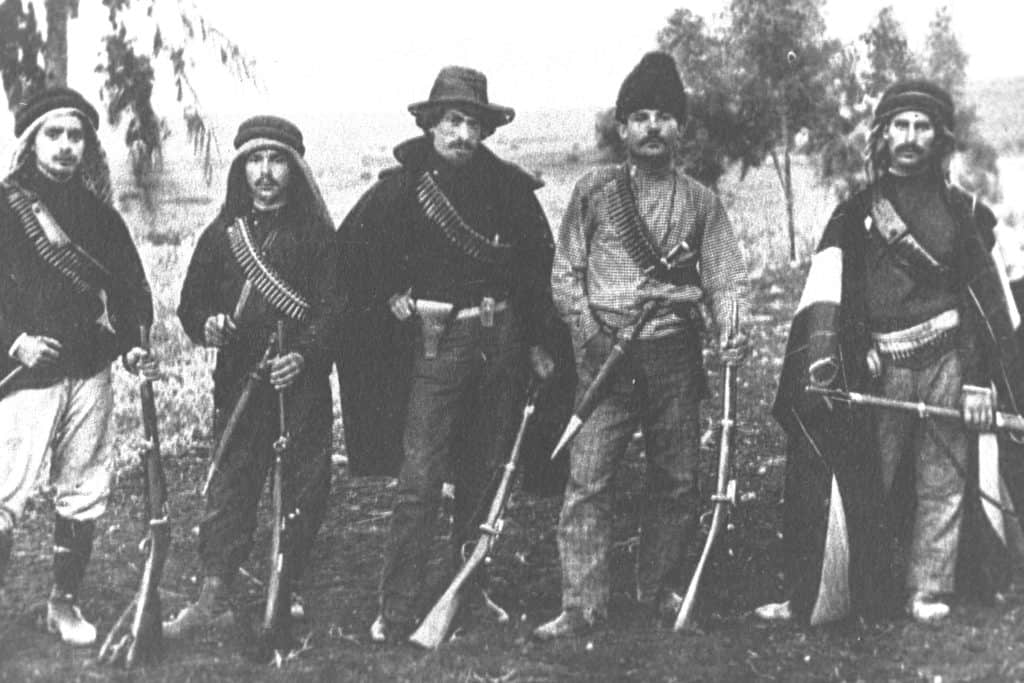Bar Giora was a secret Jewish self-defense organization and the precursor of Hashomer. Furthermore, the organization operated in Israel (Ottoman Palestine) from September 1907 to April 1909. The organization’s goal was to occupy the guard in the Jewish colonies from the Arabs and the Circassians and transfer it to Jewish hands. Named after Shimon Bar Giora, commander of the Great Revolt executed in Rome in 71 CE.

Bar Giora Historical Background
Before Bar Giora was formed, the period of the first aliyah (1882-1904) under Ottoman rule was marked by a lack of law and order. For example, wandering Bedouins often sabotaged and stole from Jewish and Arab communities. Arab villagers attacked both their neighbors and passers-by. Despite the regulations of the Jewish Pioneers who advocated for Hebrew labor, the reality forced the Jewish colonies to hire Arab workers. The first immigrants needed help and many working hands, especially during the harvest and harvest seasons, as well as guards.
The Arab and Circassian guards often enjoyed the sympathy of the Ottoman authorities and police and their support. They were allowed to carry weapons and use them better than most Jews. Furthermore, The Jewish settlers could neither work during the day nor guard at night. Moreover, when a Muslim guard wounded or killed an Arab, no revenge threatened the settlers’ lives. The second wave of aliyah brought tens of thousands of immigrants and demand for “the seizing of labor.” The Socialists, members of the “Second Aliyah,” argued that the local economy should not be dependent on the Arab practice or exploited. Hebrew work was a key component in the Zionist-Socialist ethos.
They believed it was necessary to transfer the protection of the Jewish settlements to Jewish hands. Several activists from the Po’alei Zion party began to formulate an organizational framework to move the guard to Jewish hands. Israel Giladi initially tried to operate in the Meir Shefia colony, but without success. At the Zionist Congress in The Hague in 1907, Giladi proposed establishing a defensive force, and Congress approved the spirit of things.
The Formation of the Organization
The Bar Giora organization was founded on the night of the Simchat Torah, September 29, 1907. During the third conference of the Poalei Zion party, a group of activists headed by Israel Shochat, Israel Giladi, and Alexander Zeid secretly gathered in Yitzhak Ben Zvi’s small room in Jaffa. The meeting was also attended by Yitzhak Nadav, Ben Zvi’s roommate; Dov Schweiger; Yehezkel Nisnov; Moshe Yozover; Goldstein-Givoni; Yehezkel Hankin; Mendel Portugali, and Zvi Becker.
The group decided to establish a secret organization called “Bar Giora” after Shimon Bar Giora, one of the leaders of the Great Revolt, whose goal was to occupy the labor in preserving Jewish settlement. Israel Shochat was elected commander of the organization. The organization’s slogan: “In the blood and fire of Judah has fallen, in the blood and fire of Judah will rise,” was inspired by “the thugs”, a poem by Jacob Cohen that miraculously raised the Jews who rebelled in Rome. The group aspired to establish groups of workers who would establish settlements, lead Hebrew work, train with weapons, and take over the guard to create a nucleus of a Jewish protective force.
The Bar Giora Collective
The “Bar Giora” group members, except Yitzhak Ben-Zvi and Yehezkel Hankin, were required to immigrate to the Lower Galilee and join the “collective” established by Mania Wilbushevich-Shochat in the Sejera colony. Mania Shochat convinced the agronomist Eliyahu Krause, who managed the colony on behalf of ICA, to hand over to the group members land, which they cultivated while establishing a communal way of life.
After a few months, the people of Bar Giora convinced the farm manager to hand over the guard; after proving to him that the Circassian guard was negligent in his duty. This is how Sejera Farm became the headquarters of the organization.
In the face of Arab warfare that intensified after the “Young Turks” uprising in July 1908, the need for Jewish guards increased. The members of “Bar Giora” decided to move the activity to a broader framework and establish a new and legal organization (as opposed to the “Bar Giora” organization, which was secret) called “Hashomer”. The organization’s founding meeting was held in the village of Tavor on the 21st of Nisan, the seventh day of Pesach, 12 April 1909.

